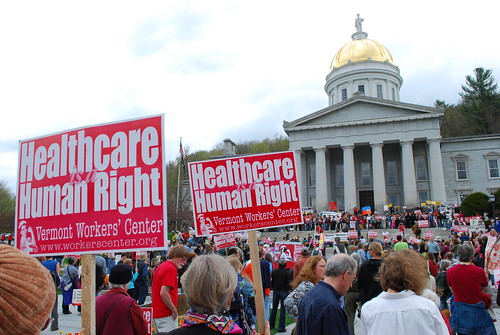This post is by Cecilia Lipp, AIUSA San Francisco Organizing City Activist Leader.

L-R: Larry Cox of Amnesty International USA, Maddy Oden of the Tatia Oden French Memorial Foundation, and Yves Boukari Traore of Amnesty International Burkina Faso
San Francisco hosted AIUSA’s maternal health speakers tour at the San Francisco Public Library Wednesday night. Amnesty International executive directors from Sierra Leone, Burkina Faso, Peru and the United States presented the findings of AI’s reports on maternal health in their respective countries, and outlined their campaigns to make every birth safe.
The panel discussion, moderated by Diana Campoamor, president of Hispanics in Philanthropy, took us through from the international to the local level. The statistics at every level are shocking. But what stays with me most are the stories of individual women denied access to lifesaving health care.

L-R: Yves Boukari Traore of Amnesty International Burkina Faso, Brima Abdulai Sheriff of Amnesty International Sierra Leone, Sameer Dossani of Amnesty International USA, and Silvia Loli Espinoza of Amnesty International Peru
Maddy Oden, founder of the Tatia Oden French Memorial Foundation, shared the intimate story of the loss of her daughter, Tatia, after an induced labor at a respected San Francisco Bay Area hospital. Tatia’s daughter Zorah passed away as well. Before speaking, Maddy lit a candle to honor the spirits of the women who have died while giving life.
In a room filled with midwives, local elected officials, our local human rights organizations and people who are all parents and children, it was so important for us to be brought back to the fact that the issue of maternal mortality is not just a question of abstract statistics or lofty human rights ideals. This is a concrete, flesh-and-blood issue that affects every person in the room, and the inspiration for this work lies in the fact that this is a crisis we can fight! These deaths, like Tatia’s, are unnecessary and preventable, especially in the United States, where geography and infrastructure do not pose a problem in the way that it might in rural Burkina Faso.

L: Silvia Loli Espinoza of Amnesty International Peru
We looked at solutions in our community, such as the bill for single-payer health care in California championed by Senator Mark Leno, supported by partner organizations including OneCare California. We, as a community, can also look to support education solutions that the Tatia Oden French Foundation proposes including increasing women’s awareness of their rights within the health care system, including the right to refusal. It’s imperative for our community to ensure that all women get everything they need to be fully informed participants in their care.
This event was a call to action: to come together in solidarity with one another and protect the life of every woman in our global community who chooses to give birth. Let us make sure every woman knows her rights, let us hold the medical community accountable (not culpable, but responsible), let us support the practice of midwives and doulas to support women in birth, let us ensure that women are visited by doctors and community members before, during and after their birth.

L-R: Maddy Oden of the Tatia Oden French Memorial Foundation (hidden), Yves Boukari Traore of Amnesty International Burkina Faso, Brima Abdulai Sheriff of Amnesty International Sierra Leone
We have our work cut out for us, but I became convinced this week that we can make this change in our community here in San Francisco. Could you do the same thing in your community? Will you work for a crucial national solution — an Office of Maternal Health? I will remember the life of Tatia Oden French and the other women just like her who die every day within the United States alone. Let us stand together in solidarity and transform this unnecessary and heartbreaking reality.
Maternal health is a human right. Motherhood and birth deserve dignity, so let us demand dignity for ourselves, our sisters, our daughters, our partners.

 While protesters have been
While protesters have been